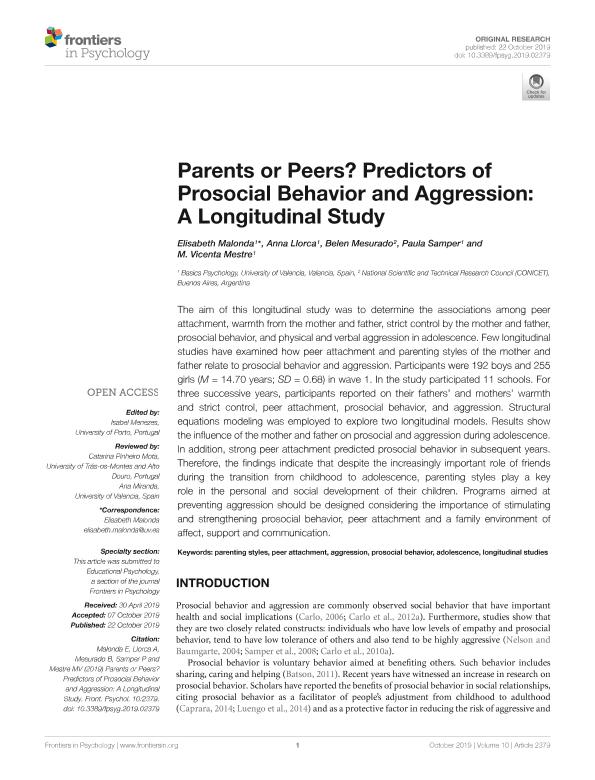Mostrar el registro sencillo del ítem
dc.contributor.author
Malonda, Elisabeth
dc.contributor.author
Llorca, Anna
dc.contributor.author
Mesurado, Maria Belen

dc.contributor.author
Samper García, Paula

dc.contributor.author
Mestre, María Vicenta
dc.date.available
2020-09-03T18:21:25Z
dc.date.issued
2019-10
dc.identifier.citation
Malonda, Elisabeth; Llorca, Anna; Mesurado, Maria Belen; Samper García, Paula; Mestre, María Vicenta; Parents or peers? Predictors of prosocial behavior and aggression: A longitudinal study; Frontiers Media S.A.; Frontiers in Psychology; 10; 2379; 10-2019; 1-12
dc.identifier.issn
1664-1078
dc.identifier.uri
http://hdl.handle.net/11336/113153
dc.description.abstract
The aim of this longitudinal study was to determine the associations among peer attachment, warmth from the mother and father, strict control by the mother and father, prosocial behavior, and physical and verbal aggression in adolescence. Few longitudinal studies have examined how peer attachment and parenting styles of the mother and father relate to prosocial behavior and aggression. Participants were 192 boys and 255 girls (M = 14.70 years; SD = 0.68) in wave 1. In the study participated 11 schools. For three successive years, participants reported on their fathers’ and mothers’ warmth and strict control, peer attachment, prosocial behavior, and aggression. Structural equations modeling was employed to explore two longitudinal models. Results show the influence of the mother and father on prosocial and aggression during adolescence. In addition, strong peer attachment predicted prosocial behavior in subsequent years. Therefore, the findings indicate that despite the increasingly important role of friends during the transition from childhood to adolescence, parenting styles play a key role in the personal and social development of their children. Programs aimed at preventing aggression should be designed considering the importance of stimulating and strengthening prosocial behavior, peer attachment and a family environment of affect, support and communication.
dc.format
application/pdf
dc.language.iso
eng
dc.publisher
Frontiers Media S.A.

dc.rights
info:eu-repo/semantics/openAccess
dc.rights.uri
https://creativecommons.org/licenses/by-nc-sa/2.5/ar/
dc.subject
ADOLESCENCE
dc.subject
AGGRESSION
dc.subject
LONGITUDINAL STUDIES
dc.subject
PARENTING STYLES
dc.subject
PEER ATTACHMENT
dc.subject
PROSOCIAL BEHAVIOR
dc.subject.classification
Otras Psicología

dc.subject.classification
Psicología

dc.subject.classification
CIENCIAS SOCIALES

dc.title
Parents or peers? Predictors of prosocial behavior and aggression: A longitudinal study
dc.type
info:eu-repo/semantics/article
dc.type
info:ar-repo/semantics/artículo
dc.type
info:eu-repo/semantics/publishedVersion
dc.date.updated
2020-04-24T17:47:19Z
dc.journal.volume
10
dc.journal.number
2379
dc.journal.pagination
1-12
dc.journal.pais
Estados Unidos

dc.description.fil
Fil: Malonda, Elisabeth. Universidad de Valencia; España
dc.description.fil
Fil: Llorca, Anna. Universidad de Valencia; España
dc.description.fil
Fil: Mesurado, Maria Belen. Consejo Nacional de Investigaciones Científicas y Técnicas. Oficina de Coordinación Administrativa Saavedra 15. Centro Interdisciplinario de Investigaciones en Psicología Matemática y Experimental Dr. Horacio J. A. Rimoldi; Argentina
dc.description.fil
Fil: Samper García, Paula. Universidad de Valencia; España
dc.description.fil
Fil: Mestre, María Vicenta. Universidad de Valencia; España
dc.journal.title
Frontiers in Psychology
dc.relation.alternativeid
info:eu-repo/semantics/altIdentifier/url/https://www.frontiersin.org/articles/10.3389/fpsyg.2019.02379/full
dc.relation.alternativeid
info:eu-repo/semantics/altIdentifier/doi/http://dx.doi.org/10.3389/fpsyg.2019.02379
dc.relation.alternativeid
info:eu-repo/semantics/altIdentifier/url/https://doaj.org/article/b53d617c5a6341c08008f7b9a2759632
Archivos asociados
